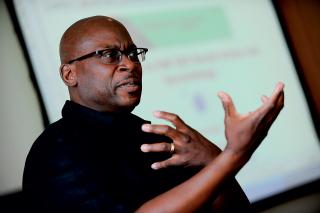As I reflect on the first days of 2021, the United States continues to struggle with intersecting pandemics of COVID-19 and racial inequity, and most recently, an insurrection of white supremacists in our nation's capital. I ask myself: Is Dr. Martin Luther King Jr.'s dream still alive?
The stark reality of hate in today's America disproportionately impacts Black, Indigenous and people of color (BIPOC). The physical violence or threat of violence leads to trauma in these communities. In the face of this adversity, I ask myself: Is King's dream still alive?
The impact of primary and secondary trauma has been correlated with medical conditions such as diabetes, chronic pain, chronic fatigue syndrome, heart disease, liver disease, sexually transmitted infections, PTSD and lower life expectancy. In the face of these realities, I ask myself: Is King’s dream still alive?
During the 1963 March on Washington, King stated in his historic “I Have a Dream” speech, "We have also come to his hallowed spot to remind America of the fierce urgency of now. This is no time to engage in the luxury of cooling off or to take the tranquilizing drug of gradualism. Now is the time to make real the promises of democracy. Now is the time to rise from the dark and desolate valley of segregation to the sunlit path of racial justice. Now is the time... to lift our nation from the quicksands of racial injustice to the solid rock of brotherhood. Now is the time to make justice a reality for all of God's children."
"It would be fatal for the nation to overlook the urgency of the moment. This sweltering summer of the Negro's legitimate discontent will not pass until there is an invigorating autumn of freedom and equality. 1963 is not an end, but a beginning. Those who hope that the Negro needed to blow off steam and will now be content will have a rude awakening if the nation returns to business as usual."
The past four years have held up a mirror to our nation — and it has been painful for many of us to see what’s reflected. But silence in times of crisis is complicity, and this is not the time to be silent. BIPOC communities deserve access to safe and affirming places that contribute to a real sense of belonging and provide needed physical and emotional care. To do this, we must continuously commit to creating and maintaining equitable and inclusive environments. Inclusive excellence is an iterative process, and it must be at the front and center of all that we do.
As I said in September, at the creation of the President’s Advisory Council on Diversity, Equity, and Inclusion, “we forget what it will look like when we go through this moment to a place that can look, feel and truly be different, where we can actually live the promises of the Bill of Rights, the Constitution, and our belief in democracy and equality. What happens when we finally live in a way that all people are equal is so empowering and exciting — but it’s not going to be easy.”
So, is King's DREAM still alive in times such as these?
Dr. King's dream was about both possibility and accountability. Now is indeed the time for us all to recommit ourselves to the transformative work required for us to create a more just, equitable, inclusive "beloved community."
In the face of the stark reality of hate in our nation, Dr. King's dream remains alive for me now more than ever.
Gary Bailey, DHL, MSW, ACSW is the Assistant Dean for Community Engagement and Social Justice in the College of Social Service, Policy and Practice at Simmons University. He is co-chair of the President's Advisory Council for Diversity, Equity and Inclusion. He is a Professor of Practice at the School of Social Work and the School of Nursing and Health Sciences. He is a past Board chair of the AIDS Action Committee-Massachusetts; and was a member of the AIDS Action Advisory Council.

